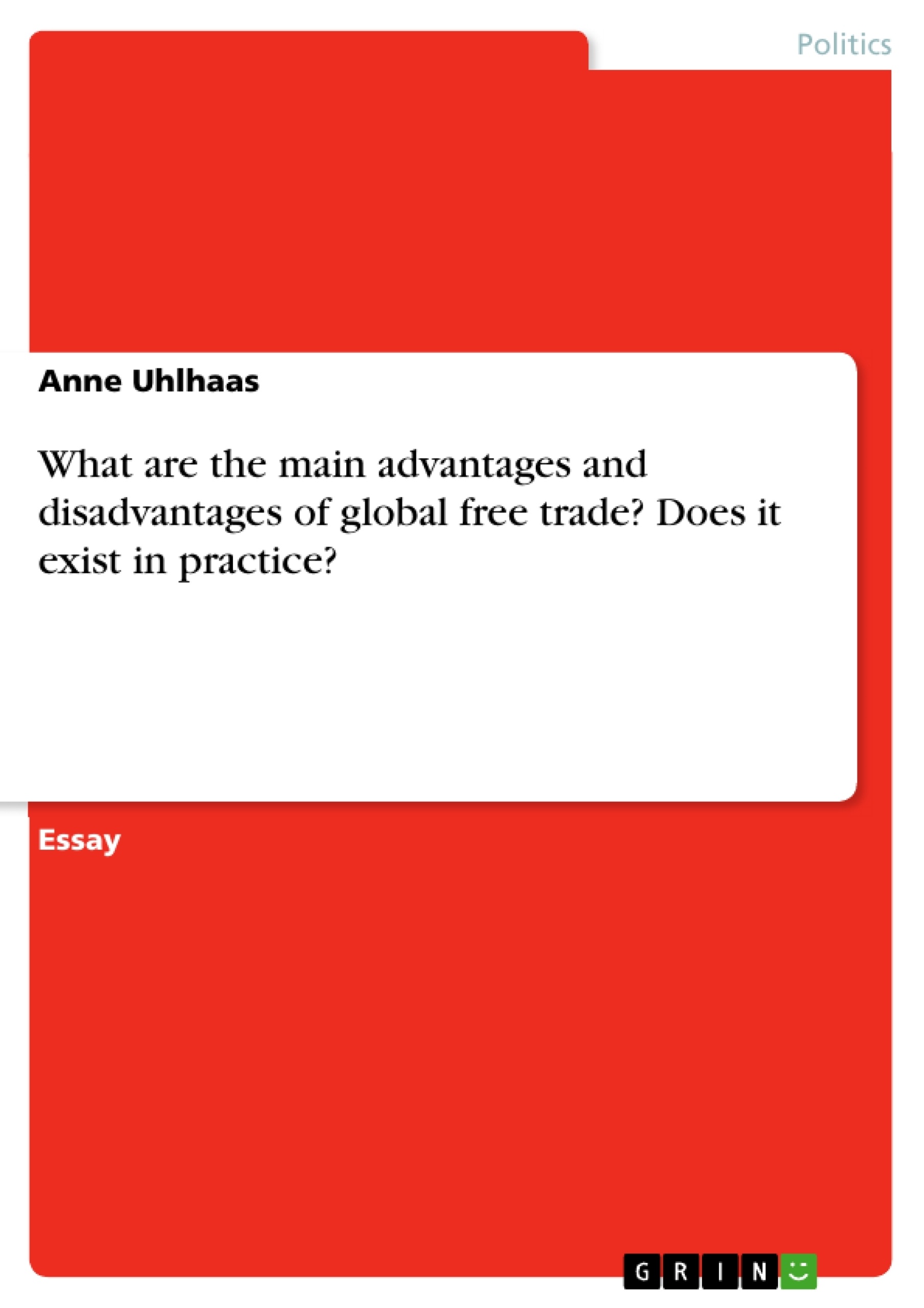The posed question comprises three different issues which have to be investigated. The first thing, implied in this question is, whether or not there are more arguments for or against global free trade both in theory and in practice. Secondly, we have to ask, if real global free trade is being practised in our times. The third issue deals with the question of how we should go on in the future. Is global free trade worth being expanded or should we better tend to protectionism?
In this essay I will argue that although free trade is said to cause some unintentional side-effects it is a better way of achieving economic and social development than protectionism. Most of the problems concerning free trade only exist due to the fact, that protectionist barriers set up by Northern countries still disturb a real free trade system and therefore constitute a disadvantage for developing countries.
I first want to work out the opportunities and benefits but also the challenges and problems of global free trade, as they are seen in our times. I will refer to the question of gains and losses for both, industrialised and developing countries. Firstly, I want to look at economic effects and will then turn to political and environmental issues and to the linking of the recent terror attacks with free trade. I will then ask the question how free trade is being practised today. Finally, I will sum up my results and will conclude with answering the question whether free trade is worth a greater expansion in the future or not.
Table of Contents
- Introduction
- Free Trade - The discussion
- Advantages and disadvantages of global free trade
- Does Free Trade exist in practise?
- Conclusion
Objectives and Key Themes
The essay examines the benefits and drawbacks of global free trade, exploring whether it truly exists in practice and considering future prospects. The main objective is to argue that free trade, despite potential side effects, is a more effective path towards economic and social development than protectionism.
- Economic advantages and disadvantages of free trade for both developed and developing countries
- Political implications of free trade, including its influence on national decision-making and special interest groups
- Environmental impacts of free trade and the relationship between trade liberalization and resource use
- The role of free trade in global security and its relation to terrorism
- The existence of free trade in practice and the effects of international trade agreements such as GATT and WTO
Chapter Summaries
- Introduction: The essay introduces the three key issues related to global free trade: the relative strength of arguments for and against free trade, the existence of true free trade in practice, and the future direction of trade policy. It lays out the argument that, despite its challenges, free trade is superior to protectionism for achieving economic and social development.
- 1. Free Trade - The discussion: This chapter contrasts two centuries-old conceptions of foreign trade policy: mercantilism and liberalism. Mercantilism, prevalent in the 18th century and experiencing a resurgence today, advocates for controlling imports to protect domestic jobs, while liberalism, formulated by Adam Smith, argues for free trade as a means of achieving international cooperation and prosperity. The chapter then explores the economic arguments for and against free trade, including the benefits for consumers, the potential for job losses in certain industries, and the economic growth experienced by countries that open their economies to international trade.
- 1.1 Advantages and disadvantages of global free trade: This section delves deeper into the economic, political, and environmental arguments surrounding free trade. It highlights the benefits of free trade for consumers, including access to cheaper products, as well as the potential negative effects on domestic producers and employment. Additionally, it discusses the political aspects of free trade, such as the potential for trade to be used as a tool of power by countries with large economies.
- 1.2 Does Free Trade exist in practise?: This section examines the practical implementation of free trade, focusing on the role of the GATT and WTO in liberalizing world trade. It highlights the significant reductions in tariffs on industrial goods and the resulting growth in world trade.
Keywords
The main focus topics and key terms include global free trade, protectionism, mercantilism, liberalism, economic development, international trade agreements, GATT, WTO, environmental impacts, and globalization.
- Citar trabajo
- Anne Uhlhaas (Autor), 2001, What are the main advantages and disadvantages of global free trade? Does it exist in practice?, Múnich, GRIN Verlag, https://www.grin.com/document/11518



